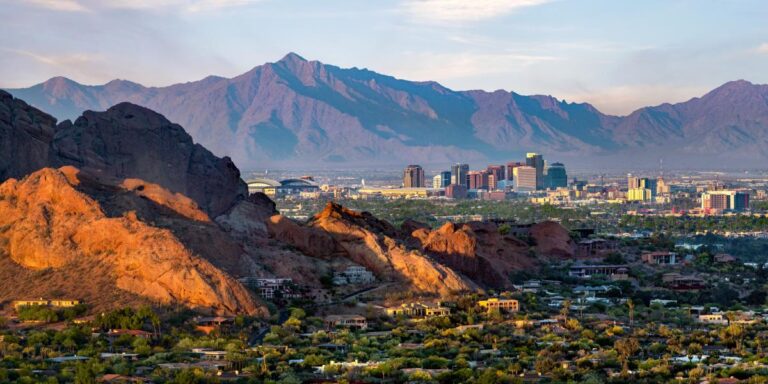By Roland Murphy for AZBEX
Starting with former Gov. Doug Ducey’s veto last summer of legislation to send a renewal of the Proposition 400 half-cent transportation sales tax to voters to approve or reject, through a multi-part special coverage issue on the history, impacts and future of Prop 400-related transportation issues and economic development, and even as recently as this week, AZBEX has been sounding the alarm about what a failure to renew the measure could mean for Arizona’s future. (AZBEX; Oct. 14, 2022 and others)
Other news outlets have been slow to pick up the story, but as a block of Republican lawmakers in the Arizona Legislature continue trying to thwart a renewal, tensions are rising and pressure is increasing. All 32 jurisdictions in the Maricopa Association of Governments have projects at risk to lose direct funding or to have projects threatened by the ripples of items currently under the Prop 400 umbrella suddenly having to compete for dollars if the measure is not renewed before it expires at the end of 2025.
Local news outlets are beginning to take notice and dedicate resources to show just how dangerous the current impasse is. Earlier this week, the Arizona Republic published a detailed exposé on projects in the city of Phoenix that political gamesmanship threatens to delay or eliminate.
The article says: The sales-tax extension would represent a nearly $37B investment to Maricopa County over the next 25 years, with the sales tax accounting for $19.5B of that revenue. The sales tax revenue would be divided between:
- 40.4% toward public transit.
- 37.4% toward freeways.
- 22.2% toward arterials and programs.
When state and federal funds are added, freeways account for nearly half of the region’s spending plan enabled by Proposition 400 money.
The revenue stream from the half-cent sales tax also opens Arizona’s door to billions of dollars in federal grant funds that are doled out on a matching basis—money that is provided so long as the region chips in, too.
The article also features a link to MAG’s MOMENTUM interactive map showing the projects included under the Investment Plan approved in 2021 by the MAG Transportation Policy Committee and the MAG Regional Council.
Included in the Republic’s regional breakdown are:
- A bridge to south Phoenix;
- Eight major roadway improvements;
- A new rapid bus route on the city’s west side;
- Two light rail extensions to the west Valley and west Phoenix;
- Multiple highway improvements;
- A new highway in southwest Phoenix parallel to I-10.
Included under the “multiple highway improvements” are nine interchange improvements on I-10, seven improvement projects along I-17 and three total projects on the Loop 101, Loop 202 and Loop 303 freeways. Related projects include improvements to Grand Avenue/US 60, improvements to the 1-17/I-10 stack, connectivity improvements between I-10, SR 51 and Loop 202, and the establishment of the SR 30 Tres Rios freeway.
In a major show of force and dedication of resources, the Republic took a similar look at the impacts the failure to renew Prop 400 will have on projects in Avondale, Buckeye, Chandler, Gilbert, Glendale, Goodyear, Litchfield Park, Mesa, Peoria, Scottsdale, Surprise, Tempe and Tolleson.
The Ripples and the Need to Act
In a separate October piece, we produced an article detailing exactly how the uncertainty around future Prop 400 funding had already indefinitely delayed key components of the Tres Rios plan, sidelining a project valued at more than $2B and widely viewed as an essential building block for West Valley economic development. (AZBEX; Oct. 11, 2022).
That’s one project. Now factor in the tens of billions of direct development dollars and, quite literally, hundreds of billions of dollars in secondary construction and economic development ripples that delaying the renewal of Prop 400, now known as Prop 400E, the obstructionists in the Legislature are playing games with.
They may see themselves as playing political poker. In reality, they are playing Russian Roulette with Arizona’s future.
This is not a time for ideology, particularly not ideology over some nebulous argument against transit funding, which has already yielded billions in construction revenue and incentivized more than $10B in private economic development.
The legislators fighting to block the renewal claim they are advocating for free enterprise and patriotic ideals. No reasonable person could argue against $10B in private economic development as proof they are on the wrong side of free enterprise at the moment. Moreover, no patriot could seriously claim to be justified in keeping a vote on the future of Maricopa County out of the hands of Maricopa County voters.
In our Midyear Update on Arizona Construction program this week, BEX Companies Founder and President Rebekah Morris urged construction industry professionals to advocate for development, for their projects and for the market as a whole.
There will never be a better time or a more important issue facing Arizona’s construction and economic development. We can only hope that continued coverage, and more efforts from major outlets like the Arizona Republic, will reach enough viewers, readers and residents in time to prevent disaster.

